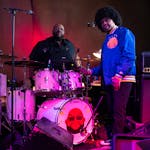After opening his set with "Louie's Lee's Liquor Lounge" on Tuesday night — the song he wrote for his favorite Midwest watering hole — Texas countryman Dale Watson stopped and looked around the crowded but pensive barroom.
"I just want to take it all in," the singer sighed. "So many memories here. And hangovers."
Twin Cities music lovers crammed into Lee's Liquor Lounge for perhaps the last time to take it all in: the glass case of ceramic Elvises; the taxidermied bobcat; the checkered dance floor that's probably had as many boots shuffle across it as cars on the nearby Interstate 394 ramp to get out of downtown.
"It's just so sad," lamented Claudia Sorbel, a Lee's patron since the 1970s. "It's so like Minneapolis to lose a classic, old, good-time place like this over light rail."
Lee's operators announced last month they have to close the bar because of nearby construction on the Southwest Light Rail Transit line (SWLRT), which will close some surrounding roads and already has taken over the 84-space parking lot that Lee's patrons have been using for free for many years. The bar's owner claims it cannot operate at a profit without that lot.
The lot, which is made up of various parcels owned by the city, Hennepin County and Minnesota Department of Transportation, was maintained by Lee's for three decades through a "handshake deal" with the city and a lease for about $400 per month with MnDOT.
Proof of the lot's importance came last weekend, after it was fenced up before a Twins home stand at nearby Target Field — usually a boon to Lee's, but patronage was way down compared with average home games.
"This is already killing us," said owner Craig Kruckeberg, who had promised to keep Lee's running relatively as-is when he bought the bar in 2015 from its longtime, legendarily low-key owner Louie Sirian.
Even as Watson plugged in for what the country singer called "the last hurrah" Tuesday at the 62-year-old bar — housed in a late-1800s-era, two-story building on the corner of Glenwood Avenue and N. 12th Street — it was not entirely clear what Kruckeberg plans to do with the property, or if the bar is even closing for good.
Kruckeberg said he still hopes for some kind of reprieve or remedy from the city and Metropolitan Council that would make up for the loss in parking and revenue, and thus allow his team to reopen during light-rail construction, or at least after construction is complete. In the meantime, he said he plans to "eat the property tax" and keep the bar shuttered.
"One of the problems is we've asked for a reliable timeline on this project, and nobody has one," Kruckeberg said, also citing concerns that "all the heavy construction is going to cause all kind of damage to a building built in the 1880s." He estimated he has already spent close to $250,000 in improvements at Lee's.
"It's hard to make any plans under these circumstances."
The founder of a successful trucking accessories company, Kruckeberg continues to pledge he does not want to bulldoze or alter the Lee's building for redevelopment, like the condo and retail structure that overtook Nye's Polonaise Room in 2016, another beloved old-school bar.
"I don't have the money to do that even if I wanted to," he said.
Met Council representatives denied Kruckeberg's claims that they have ignored his complaints.
"We've worked with them in good faith for a long time, but there's not much we can do when they don't actually own that lot," said Trevor Roy, SWLRT project spokesman.
Roy said the lot is crucial to completing the rail line, because it's near the future site of a bridge over Interstate 394. "This has all been in the works for a long time and shouldn't have come as a surprise," he added.
The issues at play are as two-sided as an old Willie Nelson LP.
On one hand, Lee's operators kept the lights on in a once-faded corner of downtown, long before Target Field or any other development interest in the area. On the other, most downtown bars and restaurants operate without their own parking, much less publicly owned lots.
And while the SWLRT will lessen traffic and provide a safer, sober transit option for patrons who aren't just ordering root beer at Lee's, supporters of the bar have pointed out the irony of building a line into downtown Minneapolis at the expense of a place that actually drew people downtown.
"There's no place else like it," said John Turner of Eden Prairie, a patron since his '80s college days. "It hasn't changed."
But the city around it certainly has. Nat and Melissa Peplinski, Lee's patrons since moving to Minneapolis from Boston several years ago, said they were confused by the direness of the parking situation.
"It seems like kind of a flimsy excuse, especially coming from Boston where there's no parking," Nat said, pointing out that the city's Ramp A and other options are nearby. "We parked just two blocks away, an easy walk."
Before being called up to the stage to sing George Jones' "White Lightning" with Watson, local bandleader Nate Dungan of Trailer Trash — unofficial house band at Lee's for 17 years — summed up the night this way: "It's harsh."
"This place never fit in economically, socially, politically or even topographically," he said. "That's why so many people loved it. But not everyone."




